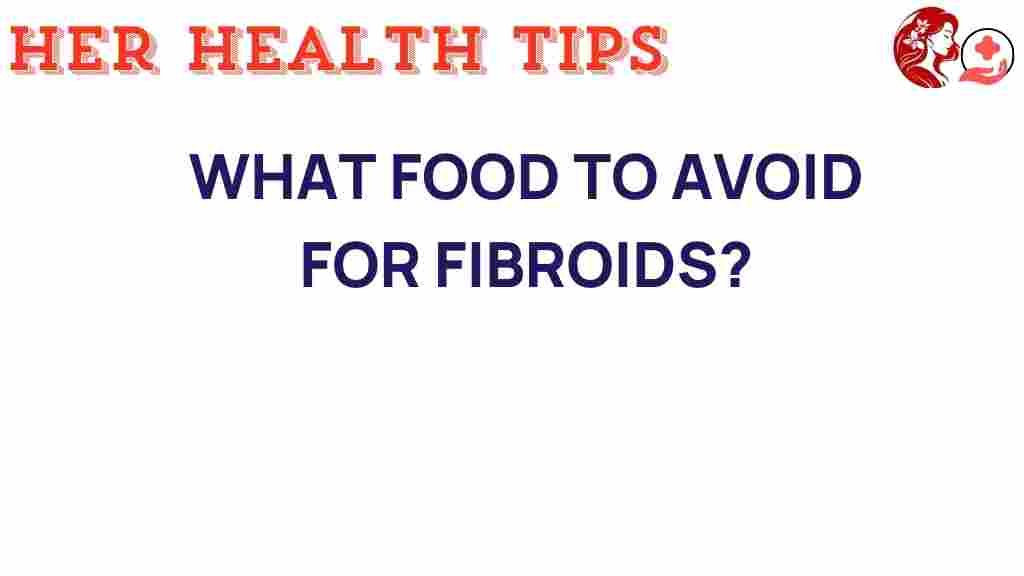Unveiling the Foods to Avoid for Fibroid Management
Fibroids are non-cancerous growths that develop in or on the uterus, affecting many women during their reproductive years. While they can be asymptomatic, some women experience significant fibroid symptoms, including heavy menstrual bleeding, pelvic pain, and pressure. Understanding how diet and nutrition impact fibroid development and management is crucial for women’s health. This article will delve into the foods to avoid for effective fibroid management, focusing on hormonal balance, inflammation, and overall health.
The Connection Between Diet and Fibroids
The foods we consume play a pivotal role in our health, particularly for women dealing with fibroids. A balanced diet can help mitigate inflammation and promote hormonal balance, which are essential for managing fibroid symptoms. Conversely, certain food choices can exacerbate issues related to fibroids. Here, we will explore the dietary components that may contribute to fibroid growth and inflammation.
Foods to Avoid for Fibroid Management
When it comes to managing fibroids through diet, avoiding specific foods can be beneficial. Here are some categories of foods to be cautious about:
- Processed Foods: These often contain additives, preservatives, and unhealthy fats that can promote inflammation.
- Red Meat: Studies suggest a link between high red meat consumption and increased risk of fibroids.
- Dairy Products: Full-fat dairy may contribute to hormonal imbalances and inflammation.
- Refined Carbohydrates: Foods like white bread and pastries can lead to spikes in insulin levels, which may influence fibroid growth.
- Sugar: High sugar intake can exacerbate inflammation and should be limited.
- Caffeine: Some studies suggest that excessive caffeine consumption may worsen fibroid symptoms.
- Alcohol: Alcohol can disrupt hormonal balance and should be consumed in moderation.
- High-Sodium Foods: These can lead to water retention and increase bloating, which may worsen pelvic pressure.
Understanding Inflammation and Hormonal Balance
Inflammation is a natural response of the body but can become problematic when chronic. Foods that promote inflammation can aggravate fibroid symptoms. On the other hand, maintaining hormonal balance is vital for women’s health, especially for those with fibroids. Certain food choices can destabilize hormones, leading to further complications.
Step-by-Step Process for a Fibroid-Friendly Diet
To create a diet that supports fibroid management, follow these steps:
1. Eliminate Inflammatory Foods
Start by removing processed foods, refined sugars, and unhealthy fats from your diet. Focus on whole, unprocessed foods instead.
2. Incorporate Anti-Inflammatory Foods
Opt for foods that have anti-inflammatory properties, such as:
- Fruits (berries, cherries)
- Vegetables (leafy greens, cruciferous vegetables)
- Whole grains (quinoa, brown rice)
- Healthy fats (olive oil, avocados)
- Fatty fish (salmon, mackerel)
3. Focus on Fiber
A high-fiber diet can help regulate hormones and improve digestion. Include plenty of fruits, vegetables, and whole grains.
4. Stay Hydrated
Drink plenty of water throughout the day to help flush out toxins and maintain hydration, which is essential for overall health.
5. Monitor Your Food Choices
Keep a food diary to track what you eat and how it affects your fibroid symptoms. This can help you identify triggers and make necessary adjustments.
Troubleshooting Tips for Managing Fibroid Symptoms
If you’re struggling with fibroid symptoms despite making dietary changes, consider the following troubleshooting tips:
- Consult a Healthcare Professional: Speak with a doctor or registered dietitian who specializes in women’s health to tailor a dietary plan for your needs.
- Consider Supplementation: Certain supplements like omega-3 fatty acids and vitamin D may support hormonal balance and reduce inflammation.
- Practice Stress Management: Stress can impact hormone levels, so incorporating mindfulness practices such as yoga or meditation may help.
- Regular Exercise: Physical activity can improve circulation, reduce inflammation, and help manage weight, all of which are beneficial for women with fibroids.
Conclusion
Managing fibroids through diet is a proactive approach that can significantly impact women’s health. By understanding the foods to avoid and focusing on nutritious, anti-inflammatory options, women can take control of their health and potentially reduce fibroid symptoms. Remember, every body is unique, and what works for one person may not work for another. It’s essential to listen to your body and consult with healthcare professionals when making dietary changes.
For more information on women’s health and nutrition, consider visiting Women’s Health Magazine. To explore specific fibroid management strategies, you can check out our detailed guide here.
This article is in the category Nutrition and created by HerHealthTips Team
